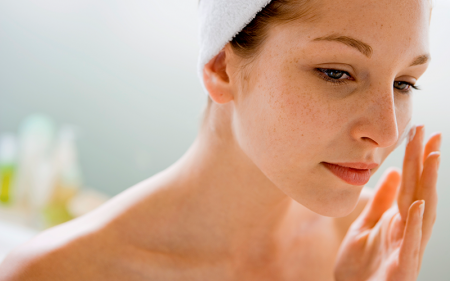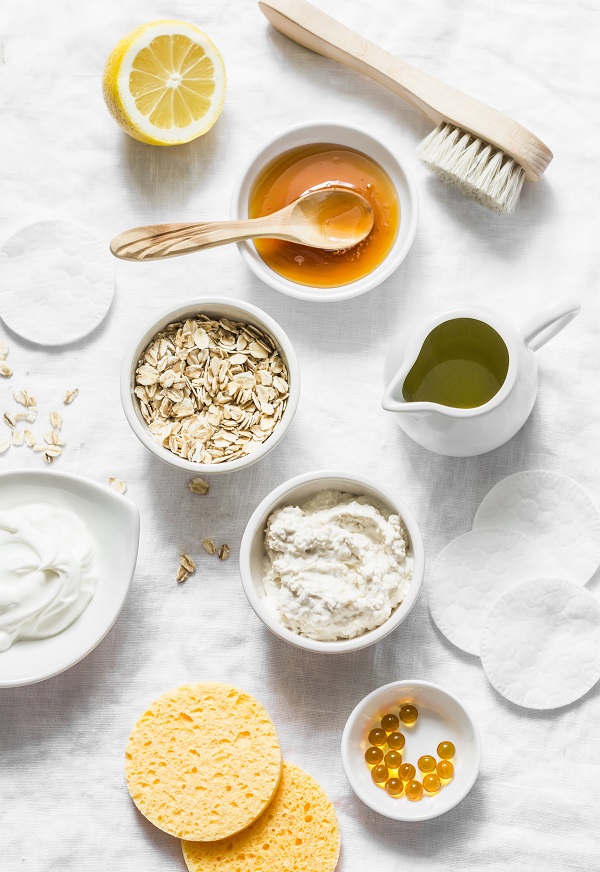There are plenty of reasons to enjoy do-it-yourself health and beauty recipes. You may like that your homemade soaps and lotions have all-natural ingredients, that you can control exactly what goes in them, that they use less packaging, and that they’re less expensive than their store-bought counterparts.
Plus, it’s just plain fun! Making your own beauty products can be rewarding in a variety of ways. I love the creativity involved in experimenting with a new craft that pampers my body, and I’ve spent an embarrassing amount of time looking at new recipes on Pinterest. I’ve enjoyed making my own moisturizer with coconut oil and my own deodorant with baking soda (and it actually worked!).
But it’s also important to recognize that some of the ingredients in your pantry may not actually be good for your skin. DIY skin care is appealing, but the benefits are sometimes questionable, and it may not be a good idea for all skin types — especially if you have difficult or “problem” skin that needs specialized care.
In some cases, the ingredients being recommended are downright dangerous and harmful to your skin. We’re all for natural beauty, but here’s what you need to know about how some of the ingredients in DIY skin care recipes can harm your skin.
Natural Ingredients That Can Harm Your Skin
 Lemon Juice
Lemon Juice
Citrus fruits like oranges and lemons are common ingredients in DIY skin care recipes, with proponents claiming that they can clear up dark spots and lighten and brighten skin. But the natural acids in lemons, limes, grapefruit, and other citrus fruit are simply too acidic to be used on your skin undiluted.
The source may be natural, but lemon juice is potent. It can disturb your skin’s natural pH level, damage your skin’s protective barrier, and make your skin more sensitive to the sun. Plus, the acid level varies from fruit to fruit, so there’s no good way to know how much acid you’re applying.
Depending on your personal skin type and tolerances, you may find that citrus juices are nice to use in moderation in a recipe, but pure lemon juice is likely to damage your skin. And don’t ever cut a lime in half and rub it on your forehead.
Vinegar
Whether it’s white vinegar, rice wine vinegar or apple cider vinegar, it’s another acid that can damage your skin if used too often or for too long. In fact, leaving apple cider vinegar on your skin for prolonged periods of time can cause some pretty serious burns.
You can check out this post on whether ACV is a good treatment for acne for more information, but don’t scroll down to the pictures without being prepared!
Sugar
Recipes abound for body scrubs that use granular ingredients — like sugar, salt, steel-cut oatmeal or even ground walnuts — as the exfoliating agent. This sounds good in principle, but grains of salt and sugar aren’t uniform. They can have sharp edges that will leave microscopic cuts on your skin, damaging the top layer of your epidermis and allowing bacteria to enter. Naturally, this can cause irritation, redness, pimples or even infection.
Depending on the sensitivity of your skin (and how hard you rub!) this may or may not cause you problems. Personally, I find that a home-made sugar scrub leaves my legs glowing, but makes my face irritated. It’s best to use natural scrubbing agents cautiously and in moderation.
Essential Oils
Tea tree oil, jojoba, lavender, peppermint — essential oils are really popular in skin care, healing and DIY cleaning recipes, and they smell great too. It’s no wonder they’re currently so popular in so many ways.
They’re also extraordinarily concentrated, and should be used sparingly! Be sure to dilute your essential oils before applying them to the skin, whether in a recipe or in water or carrier oil. Also, always patch-test on a small area (and wait 48 hours) to be sure you’re not allergic or sensitive to a particular oil.
Baking Soda
Like citrus fruits, baking soda can also mess up the pH of your skin. But while lime juice is too acidic, with a pH of 2, baking soda is too alkaline, with a pH of 9. (Your skin’s pH range should hover somewhere between 4.5 and 6.)
As with other ingredients, the dangers of using baking soda in DIY beauty remedies can vary from person to person. Some people have found that adding a small amount of baking soda to their facial cleanser once a week is a helpful exfoliant. Others find that it irritates, clogs, or burns their skin. In general, be wary of any facial exfoliant that isn’t pH balanced and designed for use on the skin.
Raw Eggs
Whether using the yolks to moisturize or the whites to tighten skin, the idea of masks and lotions using raw eggs is appealing. Eggs are full of vitamin A, collagen and protein, all of which can contribute to more youthful-looking skin.
However, some people are sensitive to vitamin A, which can cause breakouts and increased sensitivity. The egg mixture itself may clog pores and trigger breakouts. And there’s also the risk of salmonella bacteria in the raw egg, which can get into your body orally or through microscopic abrasions in the skin. If you choose to use eggs on the skin, do your research and be aware of the dangers.
Cinnamon
Common kitchen spices like ginger, turmeric and cinnamon may sound like a great addition to your latest DIY facial mask, but users report irritation and burning. That’s because spices are designed to burn! Remember the cinnamon challenge? Inhaling cinnamon makes your lungs burn and can make you cough hard enough to break ribs.
Cinnamon is dermocaustic, meaning that it’s caustic (burning) to your dermis (skin). Some people are able to put a cinnamon mask on their skin without negative side effects (although we still wouldn’t recommend it). Others experienced irritation, redness, and burning. So it’s important to do your research and patch-test any new DIY beauty recipes.
(Lack of) Preservatives
DIY beauty products typically aren’t shelf-stable, which means that the ingredients don’t last. They will degrade over time, and that means they will lose their efficacy, become rancid, and develop bacteria that damage your skin. For treatments like an egg white mask, you need to use the product immediately after making it. Other recipes, like moisturizers, may need to be kept in the fridge. They certainly should not be treated like drug-store lotions that can be kept in a cupboard for months.
How to Make Safe DIY Skin Care Recipes
We’re not trying to say that you should never remove eye makeup with coconut oil or try sugaring your legs. But we are saying that you need to do your research, use your common sense, and treat problem skin with care.
Here are our dermatologist-approved tips for safe beauty hacks at home:
Test It First
If you really, really need to try putting a ginger mask on your face, put a small amount on the underside of your wrist to see if you’re sensitive to those spices on your skin.
Use Common Sense
Don’t rub your skin raw with a sugar scrub, and don’t burn yourself with an at-home steam treatment.
Leave Problem Skin to the Experts
Please, please don’t attempt to perform extractions or treat acne at home, or try to correct any other serious dermatology issues. Medical skin conditions like cystic acne, rosacea, ringworm, and eczema need the attention of a board-certified dermatologist or licensed esthetician who has been trained in proper sanitation and safety.
Know Your Skin
Everyone has different tolerances and is sensitive to different ingredients. What works for another person may not work for you — and worse, could cause you skin damage — so don’t blindly follow the advice of beauty bloggers.
Be Hygienic
Sterilize your tools and containers before making up a batch of lotion, and store them in a cool, dry place. Then pay attention to their shelf life, and toss them if they smell or feel off.
Above all, do your homework. A quick Google search can tell you that it’s never a good idea to put cinnamon or undiluted lemon juice on your face. It’s fun to try the latest beauty trend, but that’s no reason to leave your intelligence at the door! After all, people used to eat arsenic to lighten their skin, too. Just because it’s natural doesn’t mean it’s safe.
Looking to Visit a Dermatologist
If you have any questions or concerns at all, or if you have a medical skin condition, then it’s essential to talk to a dermatologist before concocting something in your kitchen. The world sees your skin, so don’t take any risks with it! We have multiple locations throughout the country, so fill out our simple online form to get in touch with us. One of our local team members will reach out to you shortly to answer your questions or schedule an appointment for you to visit us soon.
Find a location near me
or


 Lemon Juice
Lemon Juice